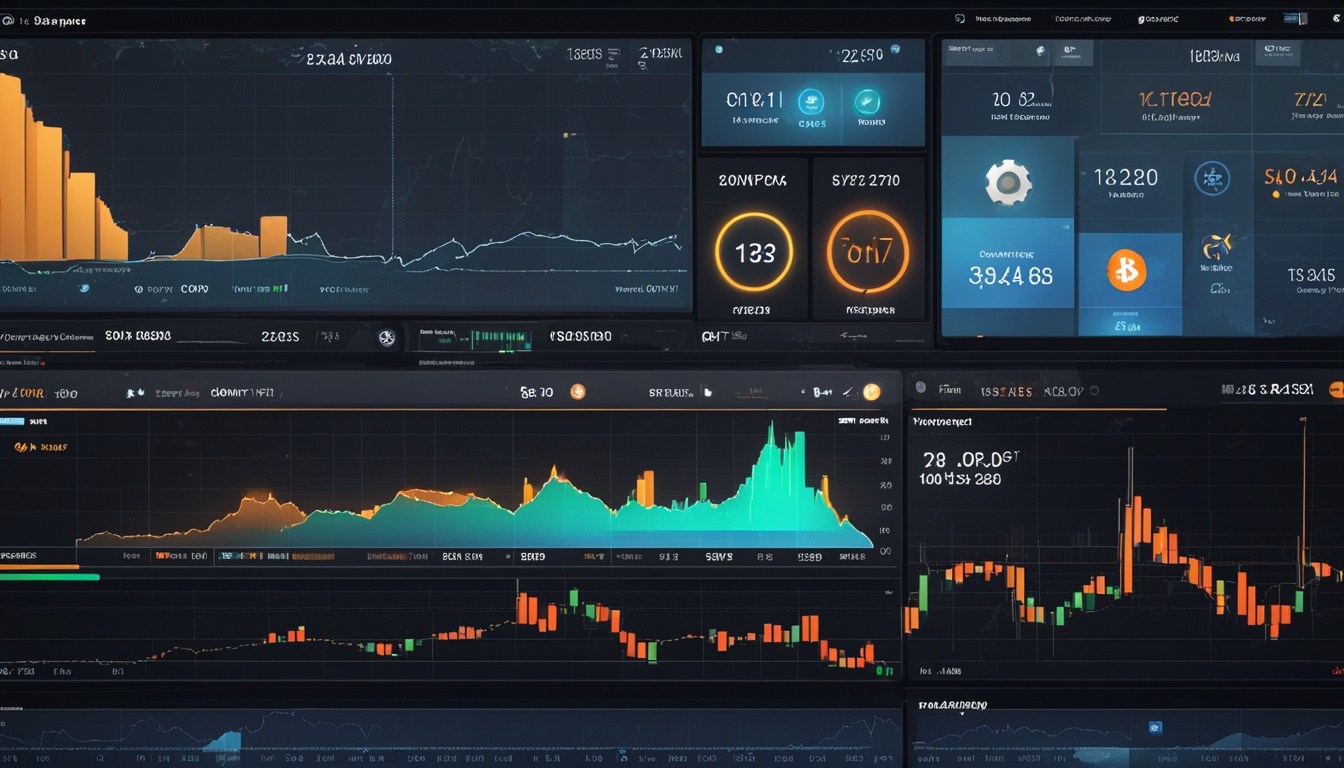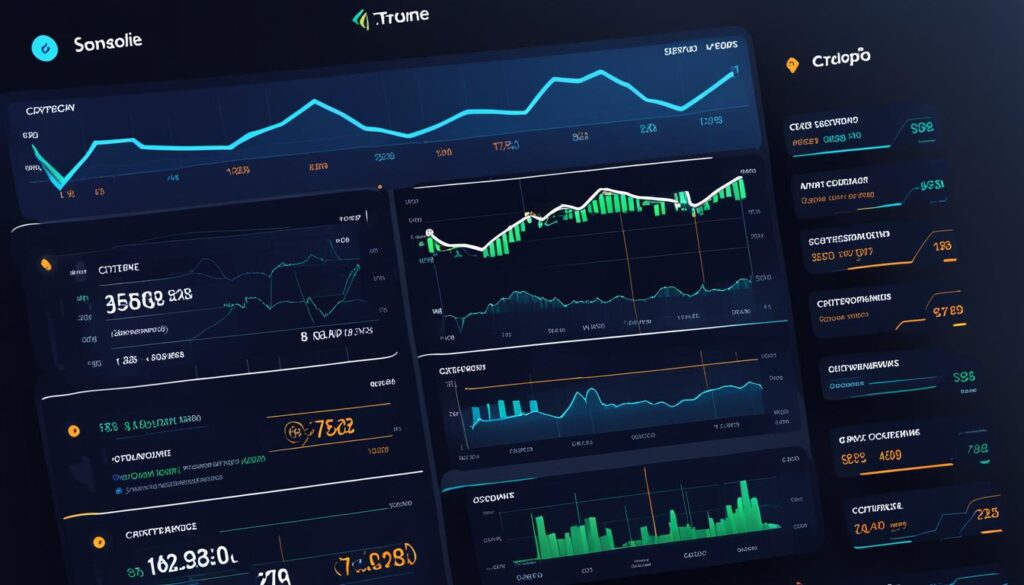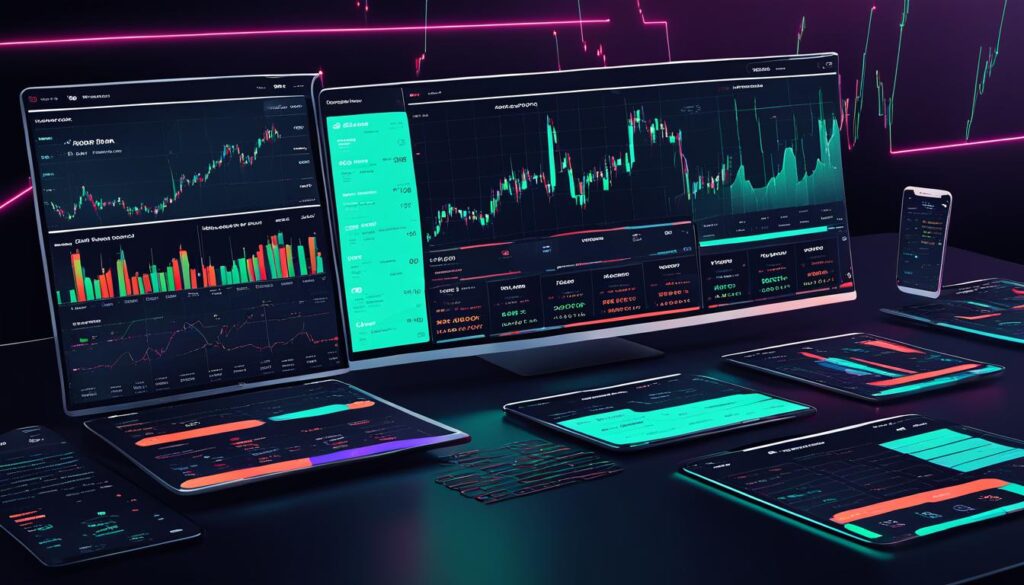The world of digital assets is changing fast. Creating reliable and feature-rich cryptocurrency exchange software is now key. With more people wanting digital currencies, there’s a big need for secure and efficient trading platforms. This article looks at the main features and costs of building a strong cryptocurrency exchange software.
Cryptocurrency exchanges are crucial for the digital asset world. They let people trade cryptocurrencies, digital tokens, and other blockchain-based assets easily. These platforms, whether they’re centralized or decentralized, offer a safe and clear place for users to buy, sell, and swap their digital assets. Creating a custom cryptocurrency exchange needs a good grasp of the market, laws, and new tech trends to be successful and last.
Table of Contents
Key Takeaways
- Cryptocurrency exchange software is key for the digital asset world, making trading digital currencies and tokens secure and efficient.
- To make a strong cryptocurrency exchange, you need to understand the market, laws, and new tech trends well.
- Important features include user sign-up and KYC checks, wallet security, and a strong trading engine with an order book.
- Features like margin trading, lending, stop-loss, and take-profit orders make the exchange more appealing to advanced traders.
- It’s vital to follow laws, keep data safe, and work with other services when making cryptocurrency exchange software.
What is a Cryptocurrency Exchange?
A cryptocurrency exchange is a digital place where people can buy, sell, and trade digital assets like cryptocurrencies and tokens. It’s like a big market for trading cryptocurrencies. Here, both individuals and big organizations can trade.
Centralized vs. Decentralized Exchanges
There are two main kinds of exchanges: centralized and decentralized. Centralized exchanges have a single person or group in charge. Decentralized exchanges use blockchain technology and don’t have a single person controlling them.
Different Types of Cryptocurrency Exchanges
There are more kinds of exchanges too. Here are a few:
- Spot Exchanges: These exchanges let you trade cryptocurrencies right away for other digital assets or regular money.
- Derivatives Exchanges: These exchanges offer things like futures and options. They let users bet on how much cryptocurrencies will cost in the future.
- Peer-to-Peer (P2P) Exchanges: These platforms connect buyers and sellers directly, skipping the middleman.
- Hybrid Exchanges: These exchanges mix the best of both worlds, offering both centralized and decentralized trading options.
Choosing an exchange depends on what you want to trade, how you like to trade, and how much you want to control your trading.
The Importance of Cryptocurrency Exchange Software
Cryptocurrency exchange software is key in the digital asset trading world. It gives the tech needed for smooth trading and managing liquidity. It also helps with platform operations. Good software makes sure transactions are safe, orders are processed well, and users have a good experience.
The heart of a top cryptocurrency exchange is its software. This software helps exchange digital assets and offers many features for traders and investors. It meets their different needs.
| Key Benefits of Cryptocurrency Exchange Software |
|---|
|
Advanced cryptocurrency exchange software lets platforms offer many trading options. This includes spot trading, margin trading, and lending. It also has features like stop-loss and take-profit orders, advanced charting tools, and portfolio management. These help traders make smart choices and manage their investments well.
In the fast-changing cryptocurrency market, strong and rich exchange software is vital. It’s the base for a secure and thriving digital asset trading world. It meets the needs of both individual and institutional investors.
“Cryptocurrency exchange software is the bedrock of a successful digital asset trading platform, enabling seamless and secure transactions, advanced trading capabilities, and a user-friendly experience for investors.”
Key Features of Cryptocurrency Exchange Software
Cryptocurrency exchange software is vital for digital asset trading platforms. It has many essential features. These help exchanges to welcome users, keep their digital assets safe, and make trading fast and reliable. Let’s look at the main parts of a full cryptocurrency exchange software solution.
User Registration and KYC Integration
Getting new users on board is key for any cryptocurrency exchange. The software needs a simple user sign-up process that works well with Know Your Customer (KYC) checks. This makes sure exchanges follow the law and can trust their traders, while also fighting fraud.
Wallet Management and Security
Keeping user wallets safe is a top priority for cryptocurrency exchange software. Users should get a secure and easy way to add, take out, and manage their digital money. Also, strong security steps, like extra login checks and safe storage options, are needed to keep users’ money safe from hackers.
Trading Engine and Order Book
A strong trading engine is at the core of a cryptocurrency exchange. It must handle lots of trades quickly. The software needs a detailed order book to match buy and sell orders well, making trading smooth for users. Things like stop-loss and take-profit orders make trading better.
With these main features, cryptocurrency exchange software helps platforms to welcome users, keep their digital assets safe, and make trading fast and reliable.
Advanced Trading Features
Many cryptocurrency exchanges now offer more than just basic spot trading. They have advanced features for experienced traders. These tools help with risk management and strategic trading. They let users try out complex investment strategies.
Margin Trading and Lending
Margin trading lets traders use more money than they have. They can borrow funds from the exchange to increase their trading power. This is great for traders who want to make the most of market changes.
Some exchanges also let users lend their extra cryptocurrency. They can earn interest on their assets this way. This creates a market for lending and borrowing in cryptocurrency.
Stop-Loss and Take-Profit Orders
Stop-loss and take-profit orders are key for managing risks. Stop-loss orders sell a position when the price hits a certain level, capping losses. Take-profit orders sell when the price reaches a profit target, securing gains.
These orders help traders control their risks and follow their strategies better. They make trading more precise and effective.
Cryptocurrency exchanges offer these advanced features for seasoned traders. They provide the tools for complex strategies and risk management. These features make the exchanges more competitive and appealing to a wider audience.
Cryptocurrency Exchange Software Development
Creating a cryptocurrency exchange software can be done in various ways. You can either build it from scratch or use open-source tools. Building from scratch lets you control every detail. Using open-source tools can make the process faster and cheaper.
Development Approaches
Businesses have two main ways to make a cryptocurrency exchange software:
- Custom platform development: This means starting from zero to make a platform that fits your needs perfectly.
- Open-source framework adoption: This uses already made frameworks like Ethereum or Hyperledger to speed up work and save money.
Popular Technology Stacks
The tech used for a cryptocurrency exchange can change based on the approach chosen. Here are some top tech stacks:
- Custom Development: React.js, Node.js, MongoDB, Redis, Kubernetes, Docker
- Open-Source Frameworks: Ethereum (Solidity, Web3.js), Hyperledger Fabric, Waves Platform
The choice of how to build and what tech to use affects the project’s time, cost, and growth potential. It’s key to weigh the good and bad of each option to match your project’s needs.
Integration with Third-Party Services
Cryptocurrency exchange software often needs to work with third-party services. This includes payment gateways and banking solutions. These services help make moving money between traditional bank accounts and cryptocurrency wallets easy.
Payment Gateways and Banking Solutions
By adding payment gateways like PayPal, Stripe, or Coinbase Commerce, users can easily add and take out money. They can use credit/debit cards and bank transfers. This makes switching between traditional and digital money simpler.
Working with banking solutions also helps. For example, APIs from banks can automate checks and manage accounts. This makes sure the exchange follows the law and makes signing up and managing accounts easier for users.
| Payment Gateway | Key Features | Supported Currencies |
|---|---|---|
| PayPal |
|
|
| Stripe |
|
|
| Coinbase Commerce |
|
|
Working with these services is key for a smooth trading experience on a cryptocurrency exchange. It helps with moving money between traditional and digital forms. This makes the exchange more useful for a wider range of users.
Regulatory Compliance and Licensing
Cryptocurrency exchanges work in a world full of rules. It’s key to follow these laws closely. The software for these exchanges must focus on following rules. This includes getting the right licenses and following know-your-customer (KYC) and anti-money laundering (AML) rules.
It’s tough to navigate the many rules for a successful cryptocurrency exchange. Exchanges need the right licenses and approvals for their markets. These rules change a lot from place to place.
Obtaining Regulatory Licenses
Cryptocurrency exchanges need special licenses to work legally. These licenses include:
- Money Services Business (MSB) registration
- Virtual Currency Business Activity (VCBA) license
- Money Transmitter license
- Compliance with Financial Crimes Enforcement Network (FinCEN) regulations
Compliance with KYC and AML
Following know-your-customer (KYC) and anti-money laundering (AML) rules is vital for exchanges. This means checking user identities, watching transactions, and reporting any odd activities to the right people.
| Regulatory Requirement | Description |
|---|---|
| KYC | Verifying the identity of users to prevent fraud and illicit activities |
| AML | Detecting and reporting suspicious transactions to prevent money laundering |
The software for cryptocurrency exchanges must work well with KYC and AML systems. This makes sure users have a good experience and keeps the exchange safe and in line with the law.
The rules for cryptocurrency exchanges are complex and always changing. To succeed, exchanges need to keep up with new rules. They must make sure their software and how they work are fully in line with the law. This builds trust, lowers risks, and keeps them legal.
Security Considerations for Cryptocurrency Exchanges
Cryptocurrency exchanges handle a lot of digital assets, so security is key. They need strong cybersecurity measures to keep user funds safe and the platform honest.
Cybersecurity Measures
Cryptocurrency exchange software must have strong cybersecurity to fight off attacks and keep user info and money safe. These steps include:
- Multi-factor authentication (MFA) to check who you are and stop unauthorized access
- Advanced data encryption to protect important info
- Comprehensive monitoring systems to catch and act on suspicious actions right away
Cold Storage and Hot Wallets
Using cold storage and hot wallets is key for security in cryptocurrency exchanges. Cold storage keeps digital assets offline for added safety. Hot wallets are online and let users quickly trade and withdraw funds. A mix of both helps exchanges keep user money safe and operations smooth.
“Security is the foundation of trust in the cryptocurrency ecosystem. Exchanges that prioritize robust cybersecurity and the safeguarding of user assets will be well-positioned to build long-term success.”
The cryptocurrency market is growing, making secure exchange platforms more important. By using strong cybersecurity and both cold and hot wallets, exchanges can keep users safe and build trust in the industry.
Cryptocurrency Exchange Software Development: Features and Cost
This section talks about the main features and costs of making a cryptocurrency exchange software. It shows why a well-made platform is key. It must meet traders and investors’ needs while keeping things secure, following the law, and growing.
Key Features of Cryptocurrency Exchange Software
A good cryptocurrency exchange software should have these key features:
- Secure user sign-up and KYC checks to follow the law
- Strong wallet management with hot and cold storage for asset safety
- Powerful trading engine for handling lots of orders and managing the order book
- Advanced trading tools like margin trading, lending, stop-loss, and take-profit orders for advanced traders
- Easy payment gateway and banking support for using fiat currency
- Comprehensive compliance and regulatory tools to follow the law
- Strong security like multi-factor authentication, AML checks, and top-notch cybersecurity
Cost Factors for Cryptocurrency Exchange Development
The cost to make a cryptocurrency exchange software varies a lot. It depends on several things, like:
- Development team size and expertise: The team’s size and how experienced they are can really change the project’s cost.
- Project scope and complexity: The more features and connections needed, the more it will cost.
- Ongoing maintenance and support: Costs for updates, security fixes, and tech support add up over time.
For a successful and affordable cryptocurrency exchange project, it’s key to partner with a trusted and skilled software provider. They should help you through the process and guide you through the complex rules.
“Creating a secure and compliant cryptocurrency exchange needs deep knowledge of the field, tech skills, and a promise to keep improving the platform for traders and investors.”
Cost Factors for Cryptocurrency Exchange Development
The cost of cryptocurrency exchange software development depends on several things. These include the team’s size and skills, and the project’s scope and complexity. The number of features, how they need to work together, and custom needs also play a part in the cost.
Development Team Size and Expertise
The team’s size and skills are key to the cost. Bigger teams with skilled developers charge more per hour. But, they finish projects faster, which can balance out the cost. Smaller teams with less experience might charge less but take longer, affecting the budget.
Project Scope and Complexity
The project’s size and how complex it is also affect the cost. A detailed exchange with many features and strong security costs more. But, a simple exchange with fewer features is cheaper but might not compete as well in the market.
| Factor | Impact on Cost |
|---|---|
| Development Team Size | Larger teams with experienced developers have higher hourly rates, but may complete the project more efficiently. |
| Development Team Expertise | More experienced developers command higher hourly rates, but they can also deliver the project faster and with higher quality. |
| Project Scope | Exchanges with more features, integrations, and customization requirements have higher development costs. |
| Project Complexity | Highly complex exchanges with advanced trading capabilities and robust security measures require more development effort and have higher costs. |
Knowing these cost factors helps businesses plan and budget for their projects. This ensures they get a solution that meets their needs and fits their budget.
Maintenance and Support Costs
Keeping a cryptocurrency exchange running well is key to its success. This means updating software, fixing bugs, keeping servers running, and helping users with tech issues. You must also think about the costs for these services when planning your budget.
A team of experts is needed to keep the exchange safe and working right. This team includes software engineers, system admins, security pros, and customer support folks. Hiring these people can be expensive, especially for big exchanges with lots of users.
It’s also crucial to keep the exchange updated and secure with software updates and bug fixes. These updates add new features, make the platform run better, and keep it safe from threats. The cost to do these updates changes based on how complex they are and how often they’re needed.
| Maintenance and Support Cost Elements | Estimated Cost Range |
|---|---|
| Personnel (software engineers, system administrators, security experts, customer support) | $50,000 – $200,000 per year |
| Software updates and bug fixes | $10,000 – $50,000 per year |
| Server maintenance and hosting | $20,000 – $100,000 per year |
| Technical support and customer service | $10,000 – $50,000 per year |
Remember, keeping a cryptocurrency exchange running smoothly costs a lot. You should think about these costs when planning your budget for the exchange’s development and operation.
Choosing the Right Cryptocurrency Exchange Software Provider
When picking a cryptocurrency exchange software provider, think about a few key things. Look at their tech skills, how long they’ve been in the industry, their security record, and how well their solutions can grow. These factors are key to a secure, legal, and easy-to-use exchange platform.
Before making a choice, check out what the provider can do. See if they know their stuff about crypto protocols, building trading engines, and managing wallets. Also, look at their experience and success in setting up exchanges for others.
Security and Compliance
Security is super important for crypto exchanges. Look closely at the provider’s security steps, like their cybersecurity, cold storage, and following the rules. Make sure they keep user money and info safe while still working well.
Scalability and Flexibility
The crypto market is getting bigger, so the exchange needs to grow too. Check if the provider can handle more users and trades, quickly add new features, and keep up with changes.
| Evaluation Criteria | Importance |
|---|---|
| Technical Expertise | High |
| Industry Experience | High |
| Security Track Record | Very High |
| Scalability of Solutions | High |
Think about these things and pick a trusted cryptocurrency exchange software provider. This way, you can make sure your crypto exchange does well and lasts a long time.
Cryptocurrency Exchange Software Development Trends
The cryptocurrency exchange software development landscape is always changing. New trends and innovations keep coming up. These include things like DeFi, NFTs, AI, machine learning, and layer-2 scaling solutions.
DeFi is a big trend now. Cryptocurrency exchanges are adding more DeFi products. This includes lending, borrowing, automated market makers, and yield farming. It lets users do more complex financial activities in the exchange.
NFTs are also becoming a big deal. Exchanges are finding ways to trade and store NFTs. These are unique digital assets that have become very popular. Adding NFTs can make the user experience better and create new ways for exchanges to make money.
AI and machine learning are coming into play too. Exchanges use these technologies to make trading better. They help with risk management and give users personalized advice. This makes trading more sophisticated and efficient.
Layer-2 scaling solutions are also on the rise. These include things like Ethereum’s Polygon or Arbitrum. They aim to make transactions faster and handle more traffic. By using these solutions, exchanges can offer quicker and more efficient trading to users.
As the cryptocurrency market keeps changing, it’s key for developers to keep up with these trends. By staying ahead, exchanges can stay competitive. They can give users a better and more feature-rich trading experience.
Conclusion
Creating a secure and full-featured cryptocurrency exchange software is key for easy trading of digital assets. Knowing the main features, costs, and trends helps businesses and entrepreneurs make smart choices. This is true when building or improving their exchanges.
Exchanges need to have many features like user sign-up and wallet management, along with advanced trading tools. It’s also vital to follow the rules and focus on security. This makes the exchange safe and easy for users.
The need for trustworthy and new exchange solutions will keep growing as the cryptocurrency market changes. By keeping up with the latest trends and tech, businesses can lead in this fast-growing market.














